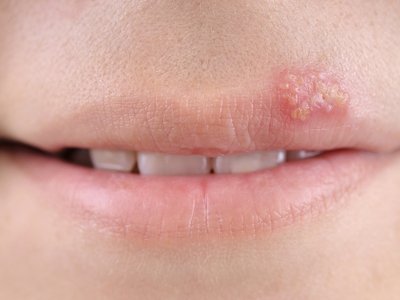Getting a cold sore is never enjoyable. Often triggered by stress, colds, and sun exposure, they tend to appear near the mouth and are difficult to conceal. Cold sores are brought on by the herpes simplex type-1 virus, which remains in the body, lying dormant in the nerves, and can flare up at any time. While it is known that in rare instances the virus can attack the eye or brain with serious consequences, it is most often considered merely a cosmetic problem. However, new research suggests herpes simplex may actually be much more dangerous.
Two separate studies, both of which were conducted by the same team of scientists at Umea University in Sweden, found that the presence of the virus may be associated with a higher risk of Alzheimer’s disease.1 Blaszczak-Boxe, Agata. “Cold sore virus linked with Alzheimer’s disease.” CBS News. 23 October 2014. Accessed 29 October 2014. http://www.cbsnews.com/news/cold-sore-virus-linked-with-alzheimers-disease In the first experiment, the subjects were 3,432 men and women the researchers followed for an average of more than 11 years. By analyzing medical records, they determined that those who had a reactivated infection with herpes simplex faced twice the risk of suffering from Alzheimer’s over time.
The second study involved obtaining blood samples from hundreds of participants and separating out the plasma. The plasma samples were stored for an average of 9.6 years prior to any diagnoses of Alzheimer’s disease being made. Then, the scientists compared the plasma samples of 360 volunteers who developed Alzheimer’s disease with the samples from 360 volunteers with no sign of the condition. They discovered that the volunteers who carried the dormant herpes simplex type-1 virus had approximately twice the risk of eventually developing Alzheimer’s as those who did not have the virus in their systems.
It certainly lends credibility to the findings that both studies used different approaches in determining a link between the conditions, yet still ended up with very similar results. Neither experiment was designed to prove cause and effect though; so they only establish a connection at this point. While knowledge is power and this information might lead to promising treatments for Alzheimer’s disease, in the short term at least, it is very worrisome if it truly doubles the risk. That’s because herpes simplex infections are very common, with approximately 90 percent of adults carrying the virus by the time they are 50, according to the National Institutes of Health. Those numbers are so high because it is quite contagious, often transmitted upon coming into contact with another person’s infected bodily fluid–which can happen even when no cold sores are present–simply by sharing a drink or kissing.
This research is not the first to establish a link between herpes simplex and Alzheimer’s disease, either. A study all the way back in 1997 at the Molecular Neurobiology Laboratory in Manchester, United Kingdom found that the presence of herpes simplex type-1 in the brains of elderly people significantly raises the risk of Alzheimer’s disease.2 Itzhaki, Ruth F.; et al. “Herpes simplex virus type 1 in brain and risk of Alzheimer’s disease.” The Lancet. January 1997. Accessed 31 October 2014. http://www.thelancet.com/journals/lancet/article/PIIS0140-6736(96)10149-5/fulltext# Scientists still do not understand the relationship between the virus and this form of dementia, or why it may lead to Alzheimer’s. One possible theory is that as we age and the immune system becomes progressively weaker, the brain is not as well protected, and the virus can migrate there. This could initiate the brain changes that are the hallmark of Alzheimer’s disease, or at least be one factor that influences its progression.
At any rate, it’s difficult to protect yourself from acquiring herpes simplex as it can be spread even without visible sores, as is evidenced by the 90% of adults who are estimated to carry the virus. But even if you have the virus and experience flare-ups fairly often, there are ways to decrease the chances of developing Alzheimer’s disease. Eating a healthy diet, doing puzzles, exercising, and even spending time with your grandchildren have all been shown in studies to lower the risk of Alzheimer’s and other types of dementia as we get older. And, based on several study findings, Jon Barron recommends supplementing with carnosine for powerful natural prevention of this disease. And there are ways to boost your immune system and also directly attack the virus to at least keep it in check and prevent active outbreaks–even as you age.
References
| ↑1 | Blaszczak-Boxe, Agata. “Cold sore virus linked with Alzheimer’s disease.” CBS News. 23 October 2014. Accessed 29 October 2014. http://www.cbsnews.com/news/cold-sore-virus-linked-with-alzheimers-disease |
|---|---|
| ↑2 | Itzhaki, Ruth F.; et al. “Herpes simplex virus type 1 in brain and risk of Alzheimer’s disease.” The Lancet. January 1997. Accessed 31 October 2014. http://www.thelancet.com/journals/lancet/article/PIIS0140-6736(96)10149-5/fulltext# |












This is a very interesting
This is a very interesting study and finding on the relationship with the herbes virus and Alzeimers Risk . I would like to add that studies also show that the closer to Earths Equator that you live is a reduction of Alzeimers , Cancers , and MS Multible Sclerosis. Is it possible that our modern day chronic ailments can be related to the location of our lifestyle and Home ? Holistic Chef Barry Anderson